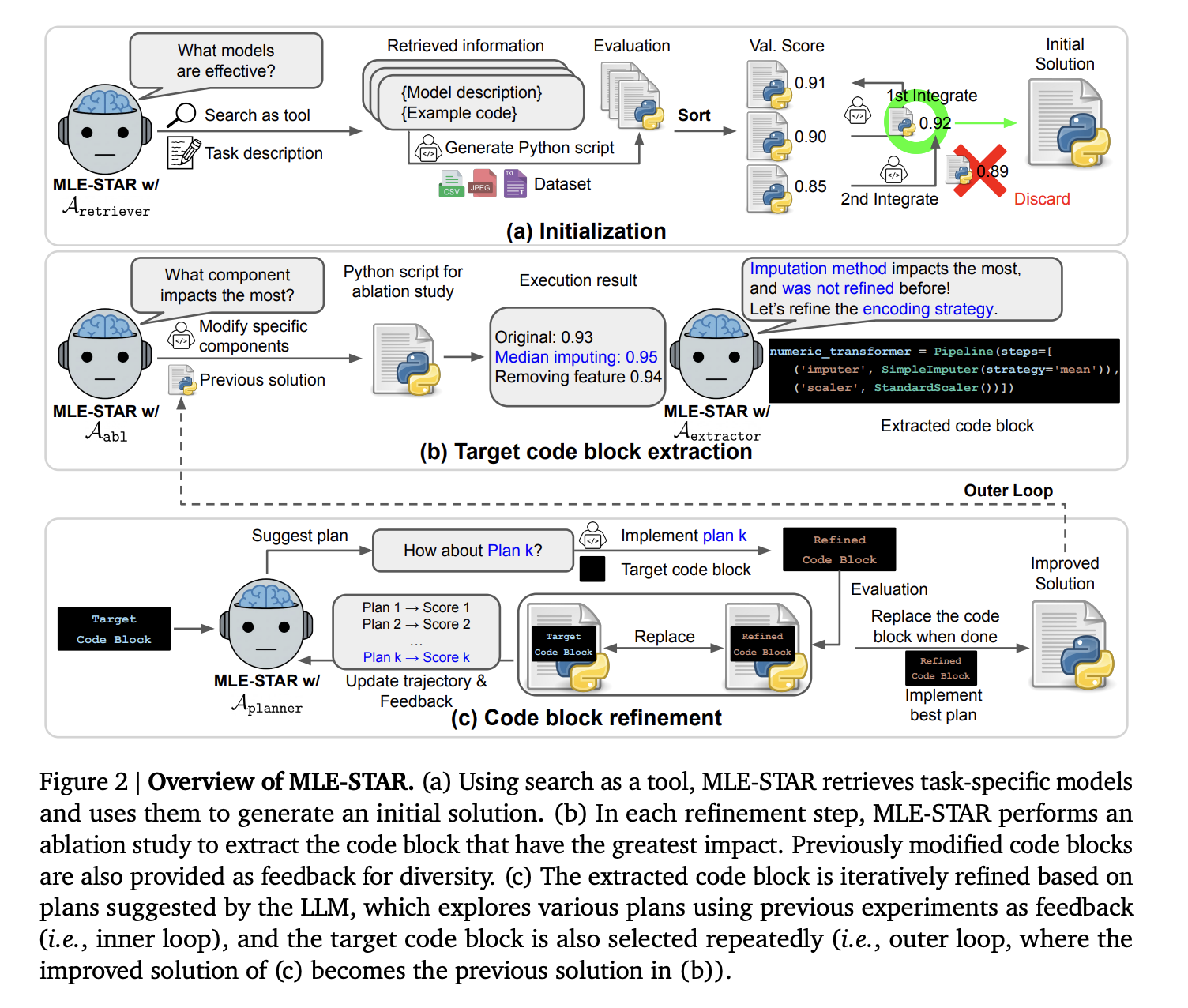August 4, 2025
5 min read
Asif Razzaq
Google AI's MLE-STAR automates complex ML pipeline design with web search, targeted refinement, and robust error handling.
Google AI Releases MLE-STAR: A State-of-the-Art Machine Learning Engineering Agent Capable of Automating Various AI Tasks
MLE-STAR (Machine Learning Engineering via Search and Targeted Refinement) is a cutting-edge agent system developed by Google Cloud researchers to automate complex machine learning (ML) pipeline design and optimization. Leveraging web-scale search, targeted code refinement, and robust checking modules, MLE-STAR significantly outperforms previous autonomous ML agents and even human baseline methods across a variety of ML engineering tasks.The Problem: Automating Machine Learning Engineering
While large language models (LLMs) have advanced code generation and workflow automation, existing ML engineering agents face several challenges:- Overreliance on LLM memory: They tend to default to familiar models (e.g., only using scikit-learn for tabular data), often overlooking cutting-edge, task-specific approaches.
- Coarse “all-at-once” iteration: Previous agents modify entire scripts in one go, lacking deep, targeted exploration of pipeline components such as feature engineering, data preprocessing, or model ensembling.
- Poor error and leakage handling: Generated code is prone to bugs, data leakage, or omission of provided data files.
- Outer Loop (Ablation-driven): Performs ablation studies on the evolving code to identify which pipeline component (data preprocessing, model, feature engineering, etc.) most impacts performance.
- Inner Loop (Focused Exploration): Iteratively generates and tests variations for the identified component using structured feedback. This approach enables deep, component-wise exploration, such as extensively testing ways to extract and encode categorical features instead of blindly modifying everything at once.
- Debugging Agent: Automatically detects and fixes Python errors until the script runs successfully or maximum attempts are reached.
- Data Leakage Checker: Prevents information from test or validation samples from biasing the training process.
- Data Usage Checker: Ensures the solution script maximizes use of all provided data files and relevant modalities, improving model performance and generalizability.
- MLE-STAR achieves more than double the rate of top-tier “medal” solutions compared to previous best agents.
- On image tasks, it overwhelmingly chooses modern architectures like EfficientNet and ViT, surpassing older models such as ResNet.
- The ensemble strategy further boosts performance by combining winning solutions rather than selecting just the best.
- Search as Foundation: By retrieving example code and model cards from the web at runtime, MLE-STAR stays up to date, automatically incorporating new model types.
- Ablation-Guided Focus: Systematic measurement of each code segment’s contribution enables precise improvements on the most impactful components.
- Adaptive Ensembling: The ensemble agent intelligently tests stacking, regression meta-learners, optimal weighting, and more.
- Rigorous Safety Checks: Error correction, data leakage prevention, and full data usage checks lead to higher validation and test scores, avoiding common pitfalls in vanilla LLM code generation.
- Human experts can inject cutting-edge model descriptions for faster adoption of the latest architectures.
- Built atop Google’s Agent Development Kit (ADK), MLE-STAR facilitates open-source adoption and integration into broader agent ecosystems. Official samples are available here.
- AI-Driven Crypto Trading Tools Reshape Market Strategies in 2025 - Explore how AI is actively influencing crypto trading strategies.
- The Future of Cryptocurrency: Explained, What's Changing, and Why It Matters - A broader look at the evolving landscape of the cryptocurrency market.
- Google Gemini for Smarter Crypto Trading - Discover how powerful LLMs like Gemini can be applied to cryptocurrency trading.
MLE-STAR: Core Innovations
MLE-STAR introduces several key advances over prior solutions:1. Web Search–Guided Model Selection
Instead of relying solely on internal training data, MLE-STAR uses external web search to retrieve state-of-the-art models and code snippets relevant to the task and dataset. This anchors the initial solution in current best practices rather than just the LLM’s memory.2. Nested, Targeted Code Refinement
MLE-STAR employs a two-loop refinement process:3. Self-Improving Ensembling Strategy
MLE-STAR proposes, implements, and refines novel ensemble methods by combining multiple candidate solutions. Beyond simple voting or averaging, it uses planning abilities to explore advanced strategies like stacking with bespoke meta-learners or optimized weight search.4. Robustness through Specialized Agents
Quantitative Results: Outperforming the Field
MLE-STAR’s performance was rigorously validated on the MLE-Bench-Lite benchmark, which includes 22 challenging Kaggle competitions spanning tabular, image, audio, and text tasks:| Metric | MLE-STAR (Gemini-2.5-Pro) | AIDE (Best Baseline) |
| ––––––––– | –––––––––––––– | ––––––––––– |
| Any Medal Rate | 63.6% | 25.8% |
| Gold Medal Rate | 36.4% | 12.1% |
| Above Median | 83.3% | 39.4% |
| Valid Submission | 100% | 78.8% |
Technical Insights: Why MLE-STAR Wins
Extensibility and Human-in-the-loop
Conclusion
MLE-STAR represents a significant leap in automating machine learning engineering. By combining web search, ablation-driven code refinement, adaptive ensembling, and specialized agents for robustness, it outperforms prior autonomous agents and many human competitors. Its open-source codebase enables researchers and ML practitioners to integrate and extend these capabilities, accelerating productivity and innovation.For more information, check out the Paper, GitHub Page, and Technical Details.
Source: Originally published at Marktechpost on August 2, 2025.

